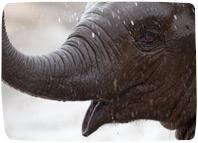 Veterinary experts are trying to determine the cause of death of a second young elephant in the space of a month at Chester Zoo. The young male, Nayan Hi Way, died on 29 July following a short illness.
Veterinary experts are trying to determine the cause of death of a second young elephant in the space of a month at Chester Zoo. The young male, Nayan Hi Way, died on 29 July following a short illness.
A statement from the zoo said: “Three-year-old Nayan was taken ill a few days ago and had been receiving veterinary treatment. Although he did appear to be making a recovery unfortunately his health deteriorated this morning and he died a short time ago.”
On 3 July Nayan’s companion and relative, two-year-old female elephant Jamilah, died from the incurable elephant endotheliotropic herpes virus (EEHV), which his affects both wild and captive elephants aged between one and four years of age.
The zoo continued: “The reason for Nayan’s death will be the subject of a post-mortem and it is too early to speculate as to the cause. Testing for EEHV will be carried out as part of the post-mortem.”
In 2009 the death of another young elephant from elephant herpes at the zoo prompted calls to an end to keeping elephants in captivity. This year the virus has since caused deaths in Europe and America.
For a number of years Chester Zoo has been heavily involved in a project supporting scientists from the University of Glasgow, the Animal Health and Veterinary Laboratories Agency and The Roslin Institute at the University of Edinburgh who have been looking into the virus. The research team recently discovered the genetic maps for two strains of EEHV.
Dr Mark Pilgrim, Chester Zoo's Director General and chair of the UK Elephant Welfare Group, said: “This is devastating news for all of us at the zoo. The loss of two young elephants has a profound effect on everyone who works so hard to provide the best level of care for the herd. Just days ago, Nayan was happy and healthy and enjoying life.
“Although it is too early to be sure of the cause of Nayan’s death, EEHV hits elephants both in the wild and in zoos. This year, there have been a number of reported cases of EEHV in elephants in America and in Europe and currently there is no cure or vaccination.
“It is important to note that this virus does not discriminate between zoo elephants and elephants in the wild. It affects them all and we will continue to support the research into this in the hope that one day a vaccine can be found to help the endangered Asian elephant.”